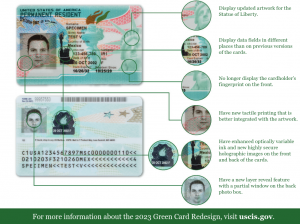EFFECT OF MARITAL TERMINATION

Divorce before green card Interview may lead to immigration issues. Given that the other person’s stay in the United State is dependent on the marriage to the U.S citizen, a dissolution of the marriage may result in the person leaving the country, unless he or she can establish an independent basis to remain in the country.
One important consideration is the immigration status of the client and the partner at the time the marriage ends. Children’s right to enter or leave the country should be also evaluated to determine whether they are affected by their parent’s divorce before green card Interview.
For a party who has lawfully entered the United States on a visa (through the sponsorship of their spouse), the counsel should determine if any of the following applies to their client:
- Entered the country as a fiancé visa holder
- Conditional permanent residency based on marriage to a United States citizen or a permanent resident
- Permanent residency with all restrictions removed on the basis of marriage to a United States Citizen or a permanent reside
Divorce Before Green Card Interview- Fiancé Visa Holder Enters U.S. and Marries
There are two probable outcomes for a person who enters the United States on a fiancé visa.
(i) Dissolution Before Adjustment of Status Filed
If a party who enters the United States based on a fiancé visa marries a U.S. citizen within 90 days 
Such a person is not able to obtain a permanent residency since the law precludes the fiancé from adjusting status if an adjustment petition has not been filed based on that relationship. The party is not also allowed to change status to non-immigrant visa or extend the fiancé status to stay in the country.
(ii) Dissolution after adjustment of Status Filed
If a holder of fiancé visa marries a U.S. citizen within 90 days of entry into the country, but the marriage ends in divorce after filing to adjustment of status of the foreign spouse, there is a chance to obtain permanent residency. The foreign spouse must however prove that the marriage was not entered for the sole reason of obtaining a green card or to evade immigration laws.
The USCIS requires the original U.S. citizen to file an affidavit of support in order for the immigration status of the other spouse to be adjusted.
Conditional Permanent Residency
The Immigration Marriage Fraud Amendments of 1986 created a 2-year ‘conditional residence’. This was enacted to help discourage marriages entered to allow people circumvent immigration laws and obtain permanent residency.
According to this amendment, the 2 year conditional permanent residency status will be given to a person who obtains permanent residency through marriage to a U.S. citizen if the parties have been married for less than 2 years at the time of;
- Entry into the country as a permanent resident
- Adjustment of status to permanent resident
Children who obtain permanent residency based on their parents’ marriage also receive the conditional permanent residency.
Before the expiry of the 2 year period, the conditional resident is required to petition to have the conditions removed. The party must show that marriage was a Bonafide marriage. Meanwhile, the conditional resident will continue to enjoy same rights as other permanent U.S citizens.
Effects of dissolution before Removal of Conditions
There is a major difference between dissolution being filed versus the divorce being final when petitioning to remove conditions on permanent residency. Depending on the situation, family lawyers may be able to bifurcate the issues in dissolution proceedings to finalize the status of divorce (Termination of marital status). Considering the length of delay of many family court proceedings, this move can help avoid negative consequences on the immigration case.
If there is a divorce before green card Interview, the conditional resident may still be able to remove the conditions and remain in the U.S. as permanent resident provided he or she can show that the marriage was entered in good faith. However, if the divorce is final, the conditional resident can file a petition to have the conditions removed with a request that the joint filing requirement be waved because of the divorce. It is important to note that the divorce before green card Interview must be final for a waiver of joint filing requirement to be granted.
In contrast, if dissolution has been filed but the status of the divorce is not final, a waiver of the joint filing requirement will not be granted, and in such a case the petition will be treated as a joint petition. A joint petition will be denied if the only one of the spouses signed the petition.
There may be a situation in which the petition to remove conditions is filed jointly, but the parties’ relationship falls apart thereafter and they file for divorce before the Green Card Interview. In that case, they may proceed by filing a joint petition if they are cooperative. If not, they must submit a final judgment and request a waiver for it to be converted into a waiver petition. This is important in the event an interview is scheduled, because both parties must appear for the interview on a joint petition.
Petitioning to Remove Conditions – Divorce Before Green Card Interview
(i) Joint Filing Requirement
A petitioner must file form I-751, Petition to Remove Conditions on Residence to remove conditions and preserve the permanent residency when the residency was based on a marriage and was obtained within 2 years of that marriage. For the petition to be accepted it should meet the following requirements;
- It must be filed within 90 days of the end of the 2-year conditional residency period, although in practice, a late filing will be excused in certain situations.
- It must be filed along with documentary evidence that the marriage was legal and was not entered into solely to procure immigration benefits. This typically includes evidence of the parties having a joint residence, the commingling of finances, joint ownership of property, affidavits of third parties, and children born to the couple.
- To be jointly filed, the petition must be signed by both the petitioner and the conditional resident.
Once it is filed, the conditional residency status is automatically extended until the merits of the petition are determined by the USCIS.
(ii) Waiver of Joint Filing Requirement
If an I-751 petition to remove conditions cannot be filed jointly, a conditional resident may file the petition with a request to waive the joint filing requirement. The waiver can be requested on the following grounds grounds;
- The marriage was entered into in good faith, but the spouse died;
- The marriage was entered into in good faith but was terminated by divorce or annulment;
- The marriage was entered into in good faith but the conditional resident was battered or subjected to extreme cruelty by the citizen spouse; or
- Termination of permanent residency and removal would result in extreme hardship.
In practice, the 90-day requirement (i.e., petitioning within 90 days of the end of the 2-year conditional residency period) is more lax when requesting that the joint filing requirement be waived.
call for case evaluation 714-390-3766

